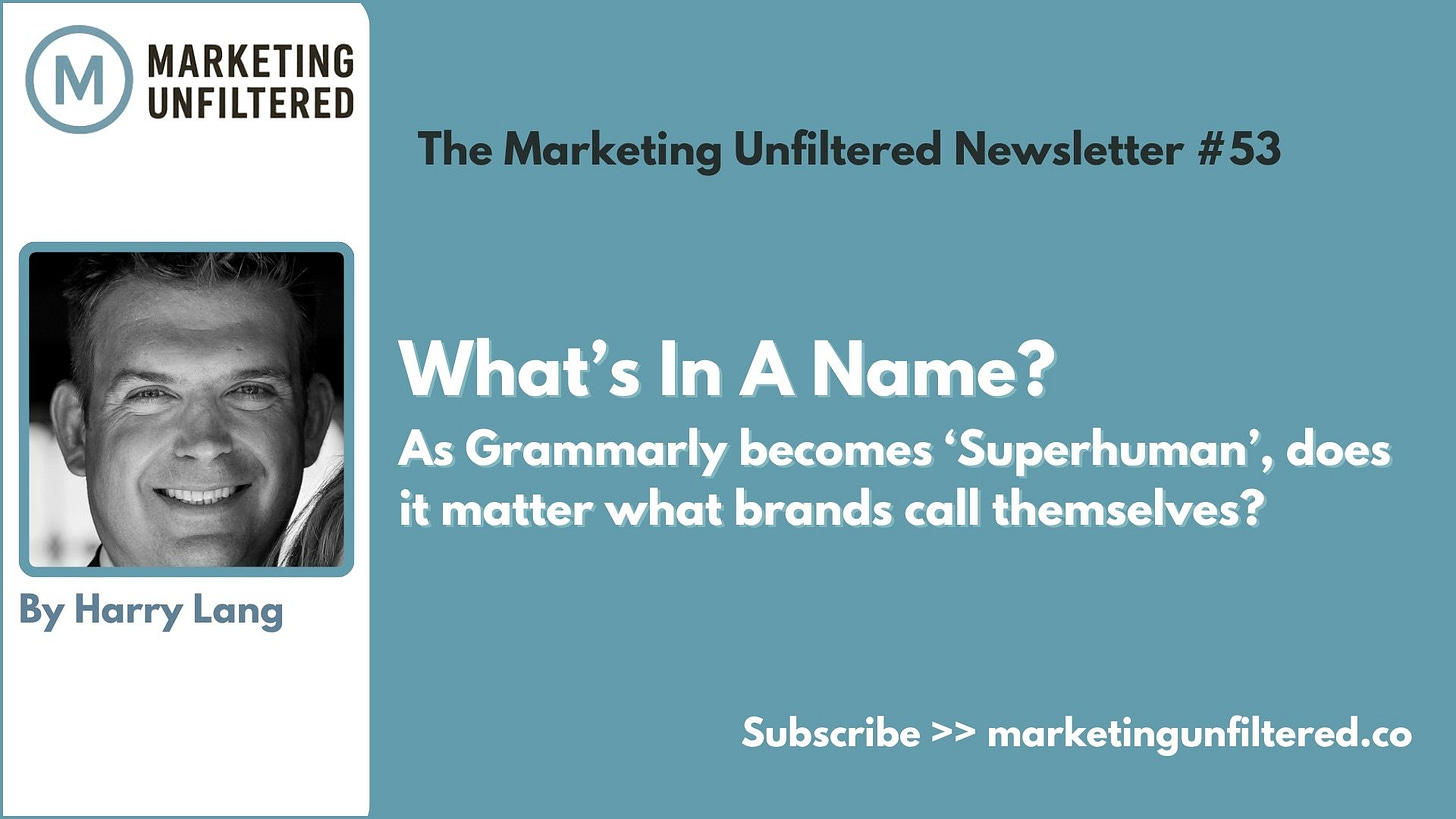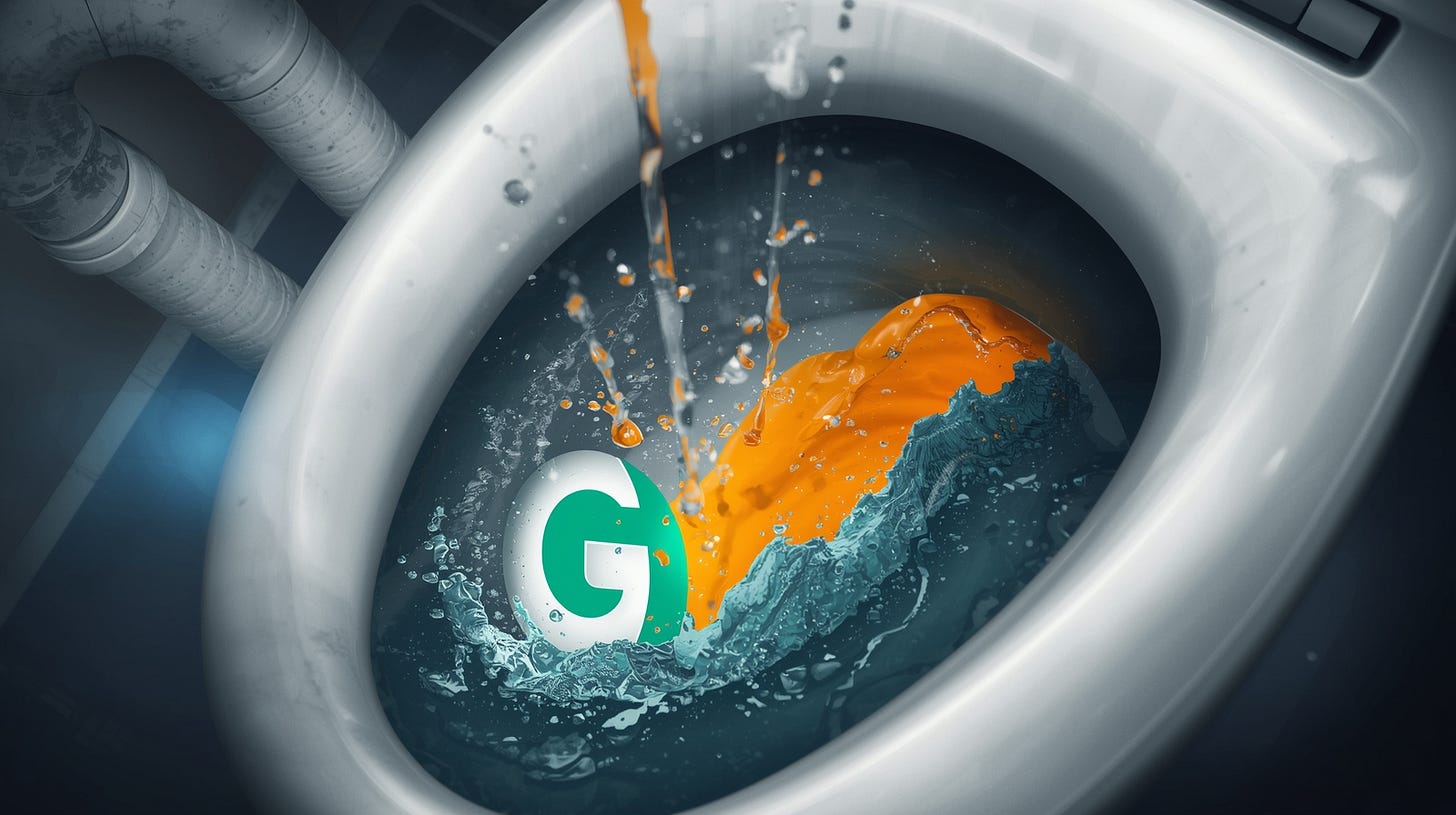What’s In A Name?
Marketing Unfiltered #53 - As Grammarly becomes ‘Superhuman’, does it matter what brands call themselves?⚠️
Harry Lang for Marketing Unfiltered
Danny and I want to thank all of you lovely subscribers for reading MU over this past year, and to all of our friends and contributors who have helped make the newsletter what it is - an unfiltered, unfettered resource which shares all the good and bad of marketing in 2025. As ever, please share the newsletter, as it’s bloody hard to build a subscriber base when there’s so much competition about!
We’d love to get to 3,000 by Christmas…
This week, I share a few thoughts on Grammarly renaming itself to ‘Superhuman’.
Enjoy!
Harry & Danny
What’s In A Name?
As Grammarly becomes ‘Superhuman’, does it matter what brands call themselves?
You can call your kids whatever you want, within reason. In the UK, you can’t officially log names that contain obscenities, numerals, misleading titles, or are impossible to pronounce – they’re likely to be rejected by the Registering Officer.
However in the Land of the Free, there’s no such qualms – you can eat a burger, buy a gun and call your kid whatever the hell you want, as my trip down the US baby naming rabbit hole proved:-
Arson, Blade, Caliber, Havoc, Khaos, Shooter (it’s Shooter’s Tour!), and Tuff are all names given to baby boys in America in the past few years.
If anything, the girls had it worse:-
Boomquifa, I’munique, L’Oreal, Mercedes, Merica (f*ck yeah!), Panthy, Phelony, Sidero (meaning ‘evil nymph’ in Latin, which any parent of a toddler can probably relate to…).
And then there’s my personal favourite (which may be apocryphal, but it’s too awesome not to share):-
‘La-a’ which, wordplay fans, is pronounced La-dash-a!
And before I’m accused of intellectual snobbery, I’m coming from a place of love - my middle name is ‘Chaplin’.
There’s actually some science behind why people name their children different things. The study of how people choose names and their potential effects through their kid’s lives is known as ‘onomastics’. Research shows that parents are often trying to tiptoe the line between unique (sorry, ‘I’munique’) and familiar names, which inevitably means there are some missteps (Yes, Musk and Grimes, you guys really took a dive on this one. I mean, ‘Exa Dark Sideræl’? It’ll take those Billions in inheritance to pay for the therapy alone…).
In the race to be special, people are choosing variants of popular names, being influenced, at least in part, by celebrities and societal trend setters.
Does it matter? Well, yes and no. Some studies suggest there’s a negative connotation if you have an unusual name (nobody is hiring baby Cyanide to front BBC News, are they?) while others find that having an uncommon name can lead to a greater capacity for impulse control and that successful people have more diverse names.
Anyway, sorry, it’s a topic rabbit hole it’s easy to get lost in. Back to the point of this piece – Grammarly.
Now, I’ll be honest – I never understood why Grammarly existed. To the untrained eye, it looked like an expensive spell checker designed for cash rich/ time poor idiots and sold through the most aggressive GTM plan in history.
At one stage, I couldn’t open social media without some high production value ad telling me to pay for something that my brain and MS Word/ Google docs had accomplished at no cost for over thirty years.
Add to that (and this is a personal peeve, so forgive me) but the name ‘Grammarly’? When your own brand name is grammatically incorrect and would be red lined by your own product isn’t that, I dunno, a clue?
So now, having spanked all that VC money becoming famous for serving up a smorgasbord of AI function while delivering a mere morsel of actual benefit, they’ve renamed themselves ‘Superhuman’.
Absurd egotistical claims aside (I mean, was ‘World’s Best Spellchecker’ deemed too wordy?) this renaming was doubly odd in that Superhuman was an email efficiency brand Grammarly purchased back in July. It’s the business equivalent of the children naming the parents, although Grammarly claimed the acquisition (and one would guess the naming upgrade) was part of the company’s push to build ‘…an artificial intelligence-powered productivity suite’ - whatever the hell that means.
Actually, we can find out, thanks to carefully crafted PR guff shared by the company when the name change was announced. Shishir Mehrotra, CEO of Superhuman said (with no hint of sarcasm, somehow):-
“The name Superhuman reflects our belief that AI should amplify human capability, not replace it or force people to adapt to its limitations. Our vision is AI that makes every person better by working everywhere they work, understanding how they actually work, and bringing them what they need at the right time, so people can stop managing tools and start focusing on work that matters”.
If you don’t speak PR clap trap, that roughly translates as:-
“We’re chasing our pound of flesh in the AI gold rush like everyone else, but you shouldn’t be scared that AI will take your job – as long as you sign up to Superhuman, AKA Grammarly. If you don’t sign up and pay our monthly fee from now until the end of time, you may as well take off your clothes and start wandering the savannah, eating trees and shrubs and roaring at the moon, because you’re a dinosaur, and you’re destined for extinction (unless you choose Grammarly. Sorry, Superhuman)”.
There’s only one Superhuman that I’ll ever care about, and that’s Channel 4’s jaw dropping, epoch defining Paralympics campaign. The spell checking, AI fluffing, SaaS selling bullshit machine comes a distant second by comparison.
I hope you enjoyed today’s newsletter. If you disagree with me entirely, feel free to comment or come and have a go at me on LinkedIn.
Have a great weekend!
Harry



